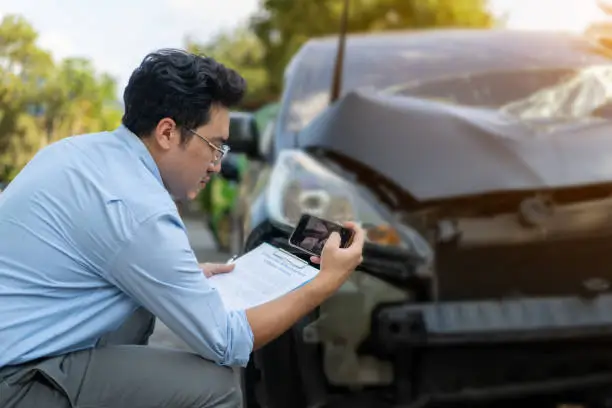When you’ve been in a car accident in New Jersey, the first two days are crucial for protecting both your health and your legal rights. After serving our Northern New Jersey community for over a century, we’ve seen how these early decisions can impact the entire course of a case.
Part 1: Immediate Steps at the Scene

Never leave the accident scene. New Jersey law requires you to:
- Call the police (even for minor accidents)
- Exchange information with other drivers
- Document the scene with photos
- Get witness contact information
Even if you feel fine, take photos of all vehicles involved. We’ve seen countless cases where initial damage appeared minor but revealed more serious issues upon inspection.
Seeking Medical Care
New Jersey’s insurance laws have specific requirements about medical treatment. Don’t wait – even if you feel “just a little sore.” Many of our clients didn’t realize the extent of their injuries until days later. Prompt medical care not only protects your health but also creates a clear link between the accident and your injuries.
Watch What You Say
In our experience, the words you use immediately after an accident matter. Avoid making statements like “It was my fault” or “I should have been more careful.” Don’t post about the accident on social media, and don’t give recorded statements to insurance companies without legal representation.
Contact Experienced Legal Help
Insurance companies often try to settle quickly, before the full extent of your injuries becomes clear. Having a local attorney who knows the courts, the insurance companies, and the community can make a significant difference in protecting your rights and ensuring fair compensation.
Why Local Experience Matters
Having handled car accident cases in our community for over a century, we’ve seen how these accidents impact families. Every case is unique, and having an attorney who knows the local courts, medical providers, and insurance company tactics can significantly impact your case’s outcome.
Remember, a car accident isn’t just about immediate medical bills – it’s about protecting your future and ensuring you have the resources needed for a full recovery. When these accidents happen, you need someone who will treat you like family, not just another case number.

Part 2: Understanding New Jersey’s PIP Coverage: What You Need to Know Now
Let’s clear up the confusion about Personal Injury Protection (PIP) in New Jersey. This isn’t just another insurance term – it’s your lifeline for medical coverage after an accident.
What PIP Really Covers
PIP isn’t just medical bills. It includes:
- Medical treatment and equipment costs
- Lost wage reimbursement
- Essential services compensation
The Numbers That Matter
Standard New Jersey policies typically include:
- $250 deductible
- 20% co-payment on medical expenses up to $5,000
- 100% coverage for bills over $5,000
- Ideally $250,000 in total PIP coverage
The Costly Mistake of Minimum Coverage
Many drivers choose minimal coverage to save money:
- Emergency Room-only PIP coverage
- $15,000 PIP coverage
Don’t fall for this trap. We’ve seen countless clients regret choosing minimal coverage after an accident. The small savings on premiums can cost you dearly when medical bills pile up.
Critical Insurance Decisions
Two key choices that matter:
- Always opt for $250,000 in PIP coverage
- Don’t select “health insurance primary”
When Bills Exceed PIP Limits
If your medical bills exceed your PIP limit, you might recover excess costs from the at-fault driver. However, if they have minimal coverage, you could face significant out-of-pocket expenses.
Part 3: Beyond the Basics: Protecting Your Long-Term Interests After a New Jersey Car Accident

After handling car accident cases for generations in Northern New Jersey, we’ve learned that it’s the things people don’t know that often hurt them most. Here’s what you need to know about protecting your long-term interests.
The Hidden Dangers of Quick Settlements
Insurance companies often make quick settlement offers, sometimes within days of an accident. While these offers might seem generous, they rarely account for:
- Long-term medical needs
- Future lost wages
- Ongoing therapy or rehabilitation
- Long-term pain and disability
Documenting Your Recovery
Keep detailed records of:
- Every doctor visit
- Physical therapy sessions
- Days missed from work
- How the injury affects your daily life
- Changes in your ability to perform regular activities
The Role of Social Media
In today’s digital age, what you post can impact your case. We’ve seen many cases compromised by innocent social media posts. Think twice before posting about:
- The accident
- Your injuries
- Your activities during recovery
- Anything that could contradict your injury claims
When to Seek Legal Help
Consider consulting an experienced local attorney if:
- You have significant injuries
- The other driver was uninsured
- Fault is disputed
- Multiple parties are involved
- The insurance company is pressuring you to settle
Remember, while New Jersey law provides specific protections for accident victims, these protections only work if you know how to use them. Having served our community for over a century, we’ve seen how proper guidance through this process can make all the difference in recovery – both physical and financial.


